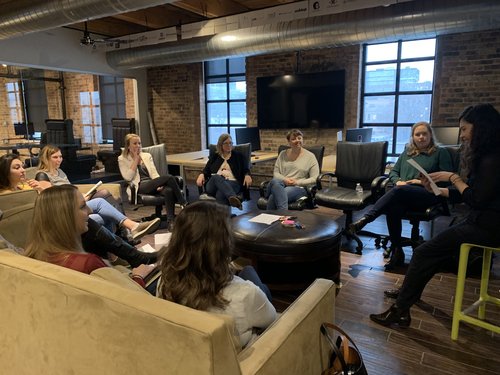The two queries I get most often about The Junto Institute are where the idea came from and where the name came from.
The key figure in both of these stories is the founding father, Benjamin Franklin, who started a group in 1727 called the Junto (believed to be pronounced YOON’ tow while ours is pronounced HOON’ tow), for mutual improvement and philosophical debate. But beyond the name and part of his purpose, how he ran his group deeply influenced the approach that we took with ours.
One of the sources of influence was a list of 24 questions that Franklin and his colleagues often used for their weekly meetings. Here is that list.
-
Have you met with any thing in the author you last read, remarkable, or suitable to be communicated to the Junto? particularly in history, morality, poetry, physics, travels, mechanic arts, or other parts of knowledge?
-
What new story have you lately heard agreeable for telling in conversation?
-
Hath any citizen in your knowledge failed in his business lately, and what have you heard of the cause?
-
Have you lately heard of any citizen’s thriving well, and by what means?
-
Have you lately heard how any present rich man, here or elsewhere, got his estate?
-
Do you know of any fellow citizen, who has lately done a worthy action, deserving praise and imitation? or who has committed an error proper for us to be warned against and avoid?
-
What unhappy effects of intemperance have you lately observed or heard? of imprudence? of passion? or of any other vice or folly?
-
What happy effects of temperance? of prudence? of moderation? or of any other virtue?
-
Have you or any of your acquaintance been lately sick or wounded? If so, what remedies were used, and what were their effects?
-
Who do you know that are shortly going [on] voyages or journeys, if one should have occasion to send by them?
-
Do you think of any thing at present, in which the Junto may be serviceable to mankind? to their country, to their friends, or to themselves?
-
Hath any deserving stranger arrived in town since last meeting, that you heard of? and what have you heard or observed of his character or merits? and whether think you, it lies in the power of the Junto to oblige him, or encourage him as he deserves?
-
Do you know of any deserving young beginner lately set up, whom it lies in the power of the Junto any way to encourage?
-
Have you lately observed any defect in the laws of your country, of which it would be proper to move the legislature an amendment? Or do you know of any beneficial law that is wanting?
-
Have you lately observed any encroachment on the just liberties of the people?
-
Hath any body attacked your reputation lately? and what can the Junto do towards securing it?
-
Is there any man whose friendship you want, and which the Junto, or any of them, can procure for you?
-
Have you lately heard any member’s character attacked, and how have you defended it?
-
Hath any man injured you, from whom it is in the power of the Junto to procure redress?
-
In what manner can the Junto, or any of them, assist you in any of your honourable designs?
-
Have you any weighty affair in hand, in which you think the advice of the Junto may be of service?
-
What benefits have you lately received from any man not present?
-
Is there any difficulty in matters of opinion, of justice, and injustice, which you would gladly have discussed at this time?
-
Do you see any thing amiss in the present customs or proceedings of the Junto, which might be amended?
There are many things we can take away from these questions. But there were three lessons in particular that most influenced our Junto.
The first was the obvious notion that questions spur better conversation, not mere topics. So we decided to use questions as the basis for most of the sessions we run. Sure, we may give a particular session a topic name but the actual conversation is stimulated by questions from the participants or our team.
The second was how Ben’s questions were framed to elicit someone’s experiences. As everyone in Junto knows, we avoid giving advice and instead encourage sharing experiences with one another.
The third key lesson we learned from Franklin’s list was the role that service played in his Junto. His group was only 12 people and yet many of the questions were about how that group could help one of its members. This deeply inspired me to bring a similar approach to our Junto, one that does whatever it can to help our many members and their companies.
So I’ll finish with what seems like some obvious questions:
-
What can you learn from Ben’s list?
-
How do you use questions as a professional?
-
What is the balance of advice vs. shared experiences in your company?
-
Which questions “speak” to you the most? The least? And why?
-
How can you build a greater sense of service in your company, regardless of its size?


